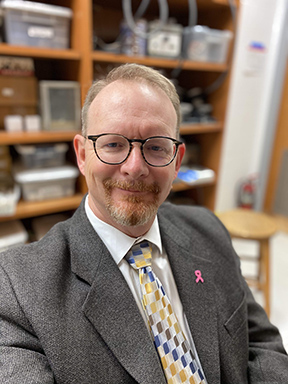Colonoscopies are worth the inconvenience
March 18, 2021

Kurt Trenkle of Hoffman Estates knew firsthand how risky delaying his colon screening could be. His brother had been diagnosed with colon cancer caught early during a colonoscopy.
So, after state COVID restrictions pushed back his first appointment last spring, 52-year-old Trenkle jumped at the first opportunity to reschedule his colonoscopy.
It is a good thing he did.
“It turns out I had some pre-cancerous cells that were contained enough that they could be removed right then and there,” he said. “I am very glad I didn’t put off the screening. Had I waited longer my outcome might be different.”
Trenkle was fortunate, but there are many more patients who were not lucky enough to catch lesions before they developed into a cancer. In fact, there are roughly 1.4 million colorectal cancer patients and survivors in the U.S. today. Moreover, the Colorectal Cancer Alliance projects nearly 150,000 more Americans will be diagnosed with the disease this year and nearly 53,000 will succumb to it.
Health experts say colorectal cancer—commonly known as colon or rectal cancer based on where the cancer starts in the body– is highly preventable but becomes less easily treatable the later it is detected. Colonoscopy screenings can identify clumps of cells that form on the lining of the colon or rectum that sometimes develop into cancer. These cells are known as polyps. And as was true in Trenkle’s case, polyps are relatively easy to remove once they are spotted.
Put simply, colonoscopies save lives.
“The inconvenience is well worth the payoff,” Trenkle said.
Experts typically recommend colorectal cancer screenings beginning at age 45 and then continuing once every 10 years after, even if there are no symptoms.
Some people might be at higher risk, and they should consider getting screened more often or start at a younger age. These individuals include those with either a family or personal history of colorectal cancer, those with an inflammatory bowel ailment like Crohn’s disease or ulcerative colitis, or those with a personal history of getting radiation to the abdomen or pelvic area. Signs and symptoms of cancer, such as blood in the stool or unintentional weight loss, should be discussed with a physician immediately to determine if additional testing is needed.
Trenkle said when he went to Mayur Parepally, M.D. for his colonoscopy last fall, NCH took every precaution to keep him safe, including a COVID test prior to the colonoscopy. And as for the colonoscopy itself, Trenkle says it is not that bad.
“The best way to describe the colonoscopy is an inconvenience. If COVID-19 has taught us anything, it’s that we can deal with inconvenience.”
March is Colorectal Cancer Awareness Month. To learn more or to schedule your colonoscopy, visit our website or call 847-618-2888.